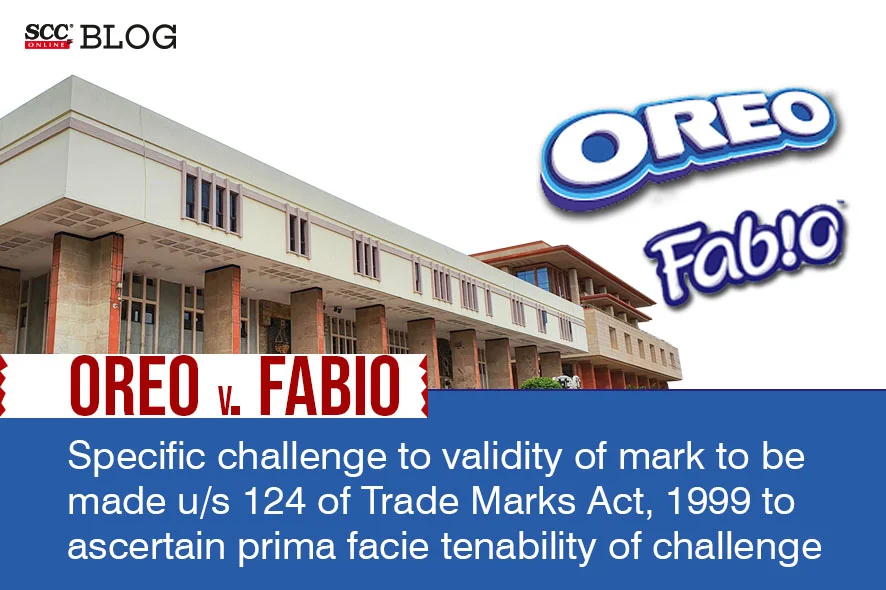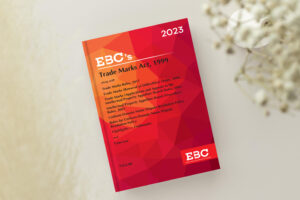Delhi High Court: In an application filed by the plaintiff under Section 124 of the Trade Marks Act, 1999 (‘the Act’), C. Hari Shankar, J.*, opined that if the plaintiff desired to question the validity of the mark ‘FABIO’, then as per Section 124(1)(b) of the Act, the plaintiff had to specifically challenge that mark. The Court by straining its interpretative faculties could not read into the plaint a plea that the registration of the defendant’s mark was invalid, where no such plea was actually made in the plaint. Thus, the Court opined that since the mark ‘FABIO’ was not the subject matter of challenge in the plaint and the plaintiff had not challenged the registration of the mark ‘FABIO’ in the defendant’s favour, the present application of the plaintiff failed, and accordingly dismissed the application.
Background
The plaintiff, International Great Brands LLC, was a proprietor of the registered device marks ![]() ,
, ![]() ,
, ![]() ,
, ![]() ,
, ![]() ,
, ![]() ,
, ![]() ,
, ![]() ,
, ![]() and word marks ‘OREO’ and ‘OREO O’S’. These marks of the plaintiffs had become synonymous with vanilla filled chocolate cream cracker biscuits manufactured by the plaintiff. The plaintiff came across the journal advertisements of trade mark applications filed by the defendant for the marks FAB!O and
and word marks ‘OREO’ and ‘OREO O’S’. These marks of the plaintiffs had become synonymous with vanilla filled chocolate cream cracker biscuits manufactured by the plaintiff. The plaintiff came across the journal advertisements of trade mark applications filed by the defendant for the marks FAB!O and ![]() , which was opposed by the plaintiff.
, which was opposed by the plaintiff.
The plaintiff submitted that the defendant had recently started manufacturing, selling and advertising cream filled biscuit namely FAB!O with the marks ‘FAB!O’, ![]() , trade dress
, trade dress ![]() ,
, ![]() and cookie trade dress
and cookie trade dress ![]() (‘impugned marks’) were virtually identical and deceptively or confusingly similar to the plaintiff’s well known and earlier trade marks.
(‘impugned marks’) were virtually identical and deceptively or confusingly similar to the plaintiff’s well known and earlier trade marks.
Thus, the plaintiff filed a suit for the grant of permanent injunction and also filed the present application under Section 124 of the Act.
Analysis, Law, and Decision
The Court relied on Dharampal Satyapal Ltd. v. Basant Kumar Makhija, 2023 SCC OnLine Del 6598 and opined that to apply for Section 124(1) of the Act, in a case where the plaintiff had sought to challenge the validity of the defendant’s mark, firstly, the defendant must raise a defence under Section 30(2)(e) of the Act by citing the registration of its mark as a defence to infringement and, if the defendant did so, the plaintiff must plead invalidity of the defendant’s mark.
The Court opined that where the defendant had raised a defence under Section 30(2)(e) of the Act, then the Court had to satisfy that the plaintiff’s plea regarding invalidity of the defendant’s trade mark was prima facie tenable and if the Court was satisfied, then Section 124(1)(ii) of the Act would have to follow. Thereafter, the Court would frame issue related to invalidity of the defendant’s mark and adjourn the suit by three months to enable the plaintiff to initiate rectification proceedings against the defendant’s mark.
Thus, the Court opined that in the present case, it had to be examined that whether the defendant had raised a defence under Section 30(2)(e) of the Act and if it had, whether the plaintiff had questioned the validity of the defendant’s mark by raising a prima facie tenable challenge.
The Court observed that in the present case, the challenge in the plaint was entirely to the validity of the ‘FAB!O’ mark of the defendant and also, against any ‘confusing or deceptively similar’ mark. However, the Court opined that if the plaintiff desired to question the validity of the mark ‘FABIO’, then as per Section 124(1)(b) of the Act, the plaintiff had to specifically challenge that mark. The Court by straining its interpretative faculties could not read into the plaint a plea that the registration of the defendant’s mark was invalid, where no such plea was actually made in the plaint.
The Court observed that the defendant had raised a defence under Section 30(2)(e) of the Act on the registration of the mark ‘FABIO’. The Court agreed with the defendant’s stand, where it had contended that the defendant had sought to plead that the trade mark ‘FABIO’ was merely a phonetic equivalent of the trade mark ‘FAB!O’ and registration of the mark ‘FABIO’ entitled the defendant to use the mark ‘FAB!O’. Thus, the Court opined that the defendant had raised a defence under Section 30(2)(e) of the Act, predicated on the registration of the mark FABIO.
The Court noted that the plaintiff had not questioned the validity of the mark FABIO or raised any prima facie tenable challenge in that regard. There was no averment, anywhere in the plaint that the defendant’s ‘FABIO’ mark was invalid and no ground of such invalidity found place anywhere in the plaint.
The Court further opined that the plaintiff’s reservation to challenge the defendant’s ‘FABIO’ marks meant absolutely nothing, as it was not the prerogative of the party to reserve rights which were not available to it. The Court opined that a party could only seek Court’s permission to reserve its right to urge a challenge at a later point of time and for that such rights must be in existence at the time when the plea was made or should be foreseeable as arising in the future. The Court opined that the right should exist before it could be reserved by anyone and by merely challenging the validity of the defendant’s FABIO mark, such right could not come into existence. Further, even if such right to reservation was accepted, it was impossible for the Court on the basis of plaint and replication to satisfy itself that a prima facie tenable challenge to the validity of the defendant’s ‘FABIO’ mark was raised by the plaintiff.
The Court opined that when no ground existed in questioning the validity of the defendant’s ‘FABIO’ mark in the plaint, the Court could not arrive at any conclusion as to whether the challenge to the defendant’s FABIO mark was prima facie tenable or not.
The Court opined that the plaintiff challenged the mark ‘FAB!O’ of the defendant as infringing in nature and the defendant did not hold any specific registration of the mark ‘FAB!O’. The defendant had pleaded a defense under Section 30(2)(e) of the Act on the registration of the mark ‘FABIO’ and as the defendant had raised its Section 30(2)(e) defence on the registration of the mark ‘FABIO’, the plaintiff was entitled under Section 124(1)(b) of the Act to challenge the validity of the said mark and since ‘FABIO’ was not the subject matter of challenge in the plaint could not inhibit the plaintiff from doing so.
The Court relied on Nadeem Majid Oomerbhoy v. Gautam Tank, 2023 SCC OnLine Del 5589 and opined that since the plaintiff had not challenged the registration of the mark ‘FABIO’ in favour of the defendant or raised any ground of such challenge, the present application of the plaintiff failed and accordingly, dismissed the petition.
The matter would next be listed on 10-01-2024.
[Intercontinental Great Brands LLC v. Parle Products Pvt. Ltd., 2023 SCC OnLine Del 7074, decided on 03-11-2023]
*Judgement authored by Justice C. Hari Shankar
Advocates who appeared in this case :
For the Plaintiff: Chander M. Lall, Senior Advocate with Nancy Roy, Aastha Kakkar, Yashi Agarwal and Abhinav Bhalla, Advocate;
For the Defendant: J. Sai Deepak, Bikash Ghorai, N.K. Bhardwaj, Anju Agrawal, Rahul Maratha, Abhishek and Avinash Kumar Sharma, Advocate








